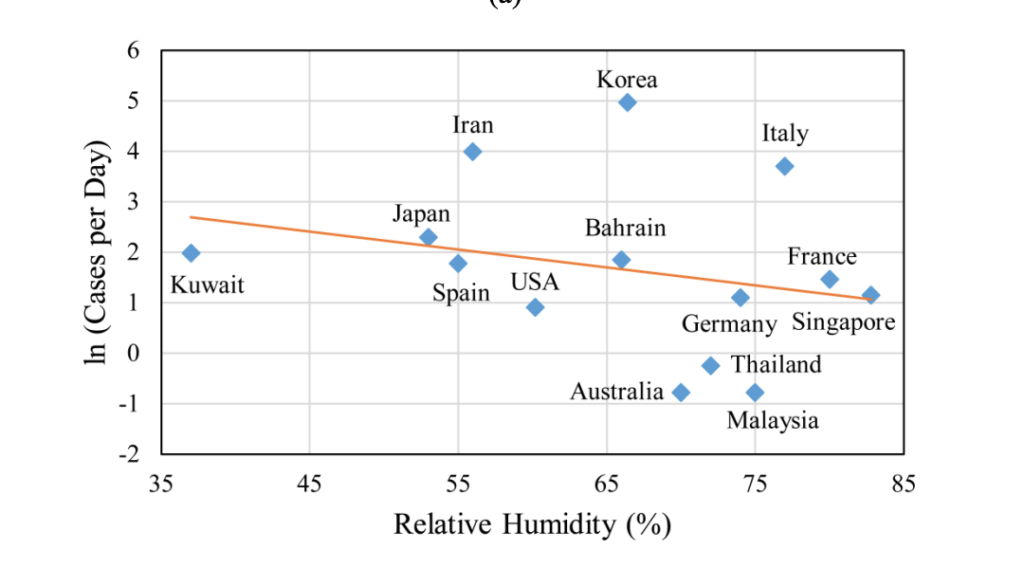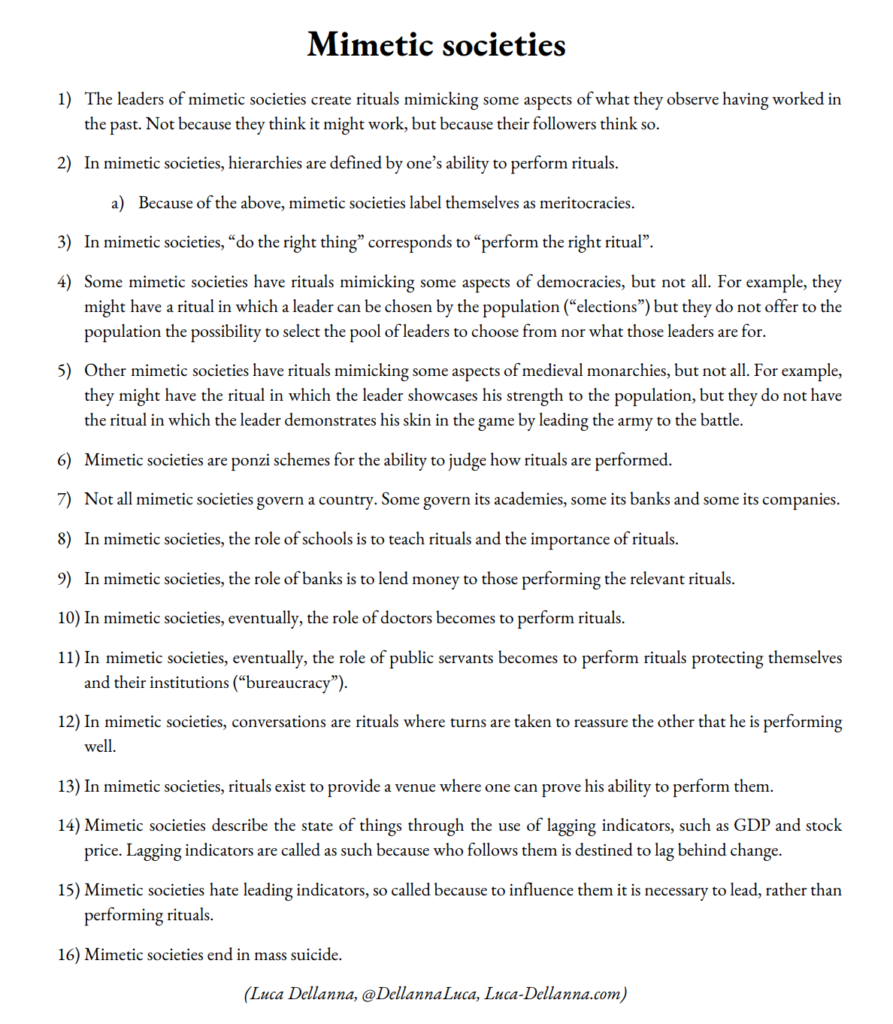Luca's monthly newsletter, on IQ, ethics, solving the right problem, and much more.
Thoughts of the Week is a review of the most interesting thoughts I encountered on Twitter and on other mediums during the last week. It is free, but if you like it, you can support me on Patreon.
1/5: Localism
“We need localism so we can establish boundaries at multiple layers, a kind of redundancy across scale.” – Joseph Norman (link)
For some reason, we are anchored to believe that borders only take place between countries (or, in federal countries, between states). There are also borders between regions, between provinces, between counties, between cities, between neighborhoods and between blocks – and they can all be more or less permeable, depending on the circumstances.
For example, in the case of a pandemic, a city which is still virus-free might want to close its borders, only letting in goods. It might accept people under conditions of mandatory quarantine.
Borders maintain configurations of people that minimize the energy required to keep them stable. They do so by grouping together people with similar values/incentives/conditions so that local policies can be tailored to them. For example, the condition to have a green zone where people can meet in restaurants is to have strong borders that keep the potentially infected out.
2/5: Tradition
“Tradition is a set of solutions for which we have forgotten the problems. Throw away the solution and you get the problem back. Sometimes the problem has mutated or disappeared. Often it is still there as strong as it ever was.” – Donald Kingsbury (link) via Shane Parrish via Rory Sutherland
The role of conservatism is to prevent overadaptation to “golden years” in which problems seem absent.
It often happens that young people want to change the way things are because they only had a few years of experience and they think that the world they experienced is all there is. They often think that conservatives are slowing them down (they are). Sometimes this is a problem and sometimes it’s a godsent.
For example, a young person who only experienced short winters might begin to question why every year the town is stockpiling so much food. They might insist that less is saved and more is eaten during the summer. Unless there are traditions to keep the stockpile intact, the town will make itself vulnerable to the next long winter.
Adapting to a trend which will last forever is smart; adapting to a temporary trend is smart only if the consequences of being hit by the trend reversal are moderate.
Traditions are the experiences of our ancestors keeping us safe from overadapting to temporary trends.
In other news
I recently started a separate newsletter with daily essays on the current COVID-19 pandemic. It is called “Covid Stuff” and you can subscribe for free here.
“Covid Stuff by Luca Dellanna is the only newsletter you need to read keep yourself rationally informed.” – Shubham Jain
3/5: Regressions
“At school we were first taught regression by getting us to draw lines, by hand, through scatter-plots. Later taught how to calculate “correct” lines using a formula. A heuristic: if you can’t hand-draw a line through the data w/o feeling like an idiot, forget regression analysis” – @tompccs (link)
For example, this chart from (paper), on the number of COVID-19 cases per day function of humidity.
If the red line hadn’t been there, would you have drawn one?
If I told you that you need to add a new spot to the chart for a new country whose h umidity is, say, 60%, would you be confident that you could predict its number of cases per day?
umidity is, say, 60%, would you be confident that you could predict its number of cases per day?
Smart people are good at finding patterns.
Wise people are good at ignoring those which are noise.
4/5: Asymmetries
“One effect of buying local was that there was less pollution, it created a desire to improve the local community. After opening it up and figuring out that long distance trade has costs (such as carbon footprint) they insist that it be fine as long as we price the cost. These people don’t understand that there is an asymmetry in pricing carbon correctly. If you price too low, you over-pollute and risk creating massive problems (this is assuming there is a critical level, otherwise it is even worse). The obvious solution is to overprice by a lot.” – Dio Mavroyiannis (link)
One of the problems of economic paradigms which compress information into a single parameter (usually, money) is that they lose all nonlinearities.
Imagine a diet where people pay you to lose weight. Would you accept to eat 100 kcal less today for $10? Perhaps. Does it mean that you value a kcal for at $0.10? No. Does it mean that you would die of starvation if someone offers you $200 a day for two weeks? Definitely no.
The example above is clearly absurd and yet, it is often used in economics in circumstances whose absurdity is less evident at the naked eye.
The general rule: when the marginal impact of something is different (i.e., it depends on how much you already have), it cannot be averaged.
This is, by the way, the reason so many people discuss the value of money. Some people would tell you that money is everything. Others would tell you it’s a nice-to-have. Both are right; the difference is that the former are referring to the first $1000 in their bank account, whereas the latter are referring to their 200th. The marginal value of money is different (it depends on how much you already have) and therefore cannot be averaged.
One solution to the decision-making problem, presented by Dio above, is to use the conversion rate that prevents the worst case. This solution has its own problems.
The other solution, proposed by Nassim Nicholas Taleb, is to simply require skin in the game, and let the fact that the decision maker is fully hit by the consequences of his actions inform him.
5/5: PPEs
“An excellent project: mass production of face masks for the general that make zero claim to be Personal Protective Equipment (PPE) in the regulated sense – in fact, include a disclaimer of such to keep the regulators off your back. They could still be of excellent quality.” – Stephen Pimentel (link)
It is pathetic that, in many cases, production of medical supplies had to happen despite the government.
In time of steady economic growth, regulations grow even faster. By the time a crisis strikes, the country is brittle: the propagation speed of damage is faster than the propagation speed of adaptation.
To slow down the former and accelerate the latter, it is useful to use circuit breakers: alternative regulations which automatically kick in locally during times of crisis. More on them here.
My own essays of the week
I recently started a free newsletter regarding the coronavirus, in which I post essays related to the current pandemic. You can sign-up or consult the archives here.
As long as the pandemic continues, I will focus most of my time working on it. The “Thoughts of The Week” newsletter might see a temporary decrease in frequency.
…
If you liked this newsletter, please share it with your friends!
They can subscribe here: luca-dellanna.com/newsletter
Otherwise, you can support me on Patreon.
…
You might also like my books
(Here is my general disclaimer.)
The order of the thoughts only represents the order in which I encountered them, and does not imply any sort of prioritization. Quotes are edited for punctuation and grammar. Eventual formatting is mine. Also text outside of italicized quotation marks is mine. The inclusion of quotes does not imply my endorsement; merely, that they gave me food for thought. I did not optimize this review for clarity, but for its ability to spark thoughts in the reader.
11. Thoughts of The Week #59 (29 Mar 2020)








